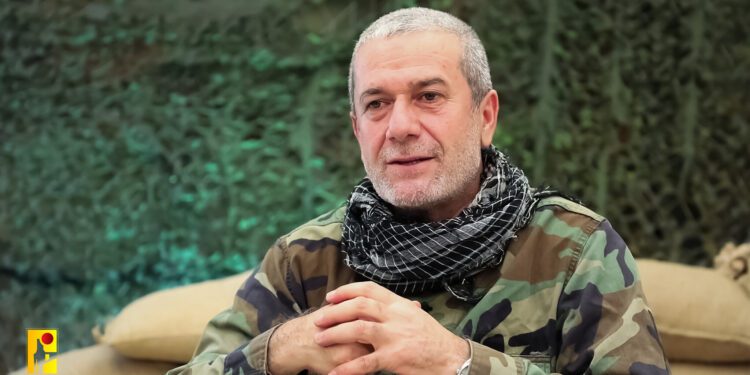In a recent escalation of cross-border hostilities, Hezbollah has reported the death of one of its senior commanders, Muhammad Nimah Nasser, known as “Hajj Abu Naameh,” following an Israeli attack in southern Lebanon. Nasser is at least the third high-ranking Hezbollah official to be killed in nearly nine months of fighting, which has heightened fears of a broader regional conflict. The Iranian-aligned Lebanese armed group responded to Nasser’s killing by launching 100 Katyusha rockets targeting Israeli military positions.
The death of Nasser, whose rank equaled that of previously killed commander Taleb Abdallah, marks a significant moment in the ongoing conflict. Abdallah, the highest-ranking Hezbollah military official killed since the group began fighting Israel in October 2023, was killed in June. Following Abdallah’s death, Hezbollah launched one of its largest rocket barrages on northern Israel. The Israeli military confirmed targeting Nasser, describing him as a counterpart to Abdallah and in charge of Hezbollah’s antitank and rocket fire from southwest Lebanon. Another top commander, Wissam al-Tawil, was killed by an Israeli strike in January.
The announcement of Nasser’s death was made on Hezbollah’s Telegram channel without specifying the location. However, sources told Al Jazeera that the attack occurred in the Hosh area of Tyre, southern Lebanon. This information was later confirmed by a source close to Hezbollah, as well as the AFP news agency. The continuing hostilities have drawn concerns from various international mediators, including US, European, and Arab officials, who are working to prevent a wider regional escalation.
The tension has prompted Israeli Prime Minister Benjamin Netanyahu to announce a shift in focus for Israeli forces toward northern Israel. Some far-right Israeli ministers have called for a full-scale invasion of Hezbollah-controlled territories in Lebanon. Meanwhile, Israeli Defense Minister Yoav Gallant has emphasized the military’s capacity to prevent a broader war but warned that Israel could devastate Lebanon’s infrastructure if necessary.
Hezbollah leader Hassan Nasrallah has declared that the group is ready for an unrestricted and unregulated war in the event of a major Israeli attack. Iran, which supports various armed groups across the region, has warned that all its allied “Resistance Fronts” would confront Israel if it attacks Lebanon.
Al Jazeera’s Assed Baig, reporting from Marjayoun in Lebanon, noted that Hezbollah’s response to Nasser’s killing included ten separate attacks. Baig reported witnessing missiles and rockets being launched from South Lebanon towards the occupied Golan Heights, with visible smoke and fires resulting from the strikes. Lebanon’s National News Agency also reported Israeli attacks on the southern towns of Khiam, Aita al-Shaab, and Markaba following the killing of Nasser.
French President Emmanuel Macron has urged Israeli Prime Minister Netanyahu to prevent a further escalation of tensions with Hezbollah. Macron expressed serious concern over deepening hostilities and emphasized the need to avoid a conflagration that could harm both Lebanese and Israeli interests. Concurrently, US Envoy Amos Hochstein, who has been actively visiting Lebanon in recent months, was scheduled to meet Macron’s envoy to Lebanon, Jean-Yves Le Drian, in Paris to discuss the situation.
Despite ongoing hostilities, Israeli Defense Minister Gallant has indicated that attacks will continue as the military prepares to take any necessary action in Lebanon. Overnight, Israeli fighter jets bombed several villages in southern Lebanon, including Yaroun, Tayr Harfa, and Aitaroun. Hezbollah’s deputy commander Sheikh Naim Kassem stated that the group would cease fighting if a full ceasefire is achieved in Gaza, maintaining this position since the conflict began.
The war has resulted in significant casualties on both sides. At least 543 people, including 88 civilians, have been killed by Israeli attacks in Lebanon. Conversely, at least 21 Israelis, including 10 civilians, have been killed in attacks by Hezbollah and other armed groups in Lebanon. The conflict’s toll in Gaza has been particularly severe, with Palestinian health authorities reporting at least 37,953 deaths since Israel launched its assault in October, following a Hamas-led attack that killed 1,139 people in southern Israel.
As the situation remains volatile, the international community continues to call for de-escalation to prevent further loss of life and a potential wider regional conflict. The ongoing hostilities underscore the fragile nature of peace in the region and the complexities involved in addressing the underlying causes of the conflict.
















